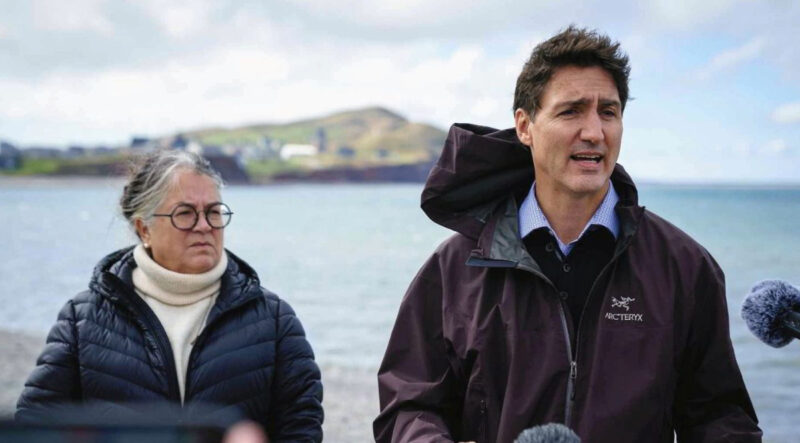Why Ottawa needs to renew salmon farming licences in BC
The responsible path towards building a strong Blue Economy, must include a vibrant BC salmon farming sector, say Canada’s land and sea farmers in an open letter to the Prime Minister
By
SeaWestNews
Canada’s land and sea farmers are urging Prime Minister Justin Trudeau to renew open-net salmon aquaculture licences in British Columbia for a minimum of six years, as the permits are set to expire next month.
“Six-year licenses – a single cycle for planning and production – is the minimum signal needed to ensure the sustainability of these farms, and the only path to hundreds of millions of dollars in investment in the badly hurting BC economy,” they said in open letter to Trudeau.
The letter was signed by Timothy Kennedy President & CEO Canadian Aquaculture Industry Alliance and Keith Currie President Canadian Federation of Agriculture.
The Coalition of First Nations for Finfish Stewardship (FNFFS) has also called for the immediate renewal of long-term salmon farm licensing saying it will encourage investments in emerging technologies as well as provide First Nations time to conduct research and trials on new technologies in their territories.
The Federal government is currently considers renewing the expiring salmon farming licenses pending the formulation of a Transition Plan for the sector in the province.
The Liberal government, at the behest of activists, has already shut down 40% of salmon farms since 2020, increasing carbon emissions and wiping out jobs that are the lifeblood of rural, coastal and Indigenous communities.
Before the shutdowns the salmon farming sector was the largest agri-food export in British Columbia. The sector employed approximately 6,500 people, produced close to 500 million salmon meals per year, received inputs from over 1,000 individual suppliers and had an economic value of $2 Billion.
Today, 100 per cent of BC’s farmed salmon is raised in agreement with Rights Holder First Nations. The partnerships directly and indirectly employ over 700 Indigenous people and provides $120 million in total annual direct and indirect economic benefits to First Nations, with $42 million going directly to Indigenous communities.
Taken as a whole, the entire sector now generates over $1.142 billions of direct economic activity in BC annually supporting approximately 6,000 direct and indirect jobs.
Earlier this month, the Coalition of First Nations for Finfish Stewardship, released a comprehensive report, to reinforce the socio-economic importance of the sector and stressed that the future of salmon farming in BC must be determined by First Nations who want to farm fish in their traditional territories.
The ‘scientific textbook’ called Modern Salmon Farming in British Columbia: A Review, is also aimed at closing the knowledge gaps about the industry and counter the campaign of disinformation by anti-salmon farming opponents.
Here is the letter sent to the Prime Minister…
Re: A Responsible Plan for BC Salmon Farming
Dear Prime Minister
We understand that there are important discussions taking place on the future of British Columbia salmon farming.
We want to remind you that your commitment is to develop a “responsible” plan. The Minister of Fisheries, Oceans and the Canadian Coast Guard has also said that she is seeking to present a plan that is realistic and achievable. We believe, as we believe that you do as well, that in the midst of an affordability crisis, “responsible” means achieving greater domestic food affordability and security, jobs and the health of Canadian families and communities, including key First Nations partners who choose to have salmon farming in their traditional territories.
British Columbians have clearly said their top issues of concern are access to affordable housing, affordable food and access to doctors – not salmon farming. Any further reduction of Canadian-grown salmon in a supply-constrained global salmon market will increase prices for Canadians for their favourite seafood choice and ensure that the supply is foreign product.
Additional leading concerns of Canadians and British Columbians are jobs, inflation and overall affordability. The BC salmon sector has already been reduced by 40 per cent since 2020. Small coastal communities cannot afford any further job reductions. Many of the thousands of jobs dependent on a strong salmon farming sector are in remote locations and in Indigenous communities where there are few other employment opportunities.
Salmon farming is highly regulated in Canada. The sector has achieved a milestone of 100 per cent of remaining farm production under agreement with local rights-holder First Nations whose communities depend on the sustainable future of these farms. This should be recognized and celebrated.
The responsible, realistic and achievable path is to continue to follow peer-reviewed science and improve the management of this sector to drive more investment in technology and innovation with the objective to further reduce any unacceptable risks to wild salmon. Six-year licenses – a single cycle for planning and production – is the minimum signal needed to ensure the sustainability of these farms, and the only path to hundreds of millions of dollars in investment in the badly hurting BC economy.
Prime Minister, the world has changed since the original transition commitment in 2019. We have had the global COVID pandemic. We have wars in Ukraine and the Middle East. We have had subsequent serious supply chain dislocations. Another election cycle in the U.S. could produce an uncertain outcome for Canadian trade. And we have the ongoing challenge of climate change.
Your government has committed to a blue economy, to evidence-based decision-making, to Indigenous economic reconciliation and partnership in natural resource industries and to addressing the affordability crisis.
The responsible path must include a vibrant BC salmon farming sector.
We urge you to support an immediate renewal of 6-year salmon farming licenses for the remaining farms in coastal BC.
Sincerely,
Timothy Kennedy
President & CEO
Canadian Aquaculture Industry Alliance
Keith Currie
President
Canadian Federation of Agriculture
(Facebook image of Prime Minister Justin Trudeau and Fisheries Minister Diane Lebouthillier)

